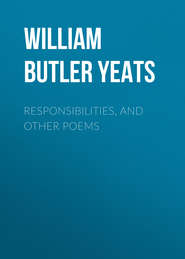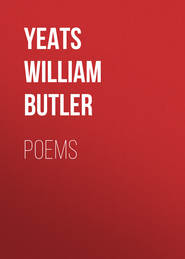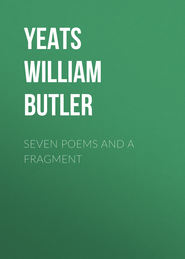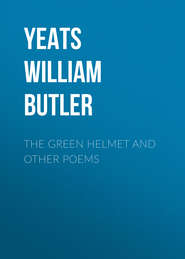По всем вопросам обращайтесь на: info@litportal.ru
(©) 2003-2024.
✖
The Collected Works in Verse and Prose of William Butler Yeats. Volume 2 of 8
Настройки чтения
Размер шрифта
Высота строк
Поля
FERGUS
We’ll play at chess
Till the king come. It is but natural
That she should fear him, for her house has been
The hole of the badger and the den of the fox.
NAISI
If I were childish and had faith in omens
I’d rather not have lit on that old chessboard
At my homecoming.
FERGUS
There’s a tale about it, —
It has been lying there these many years, —
Some wild old sorrowful tale.
NAISI
It is the board
Where Lugaidh Redstripe and that wife of his
Who had a seamew’s body half the year
Played at the chess upon the night they died.
FERGUS
I can remember now: a tale of treachery,
A broken promise and a journey’s end.
But it were best forgot.
[DEIRDRE has been standing with the women about her. They have been helping her to put on her jewels and to put the pigment on her cheeks and arrange her hair. She has gradually grown attentive to what FERGUS is saying
NAISI
If the tale’s true, —
When it was plain that they had been betrayed,
They moved the men and waited for the end
As it were bedtime, and had so quiet minds
They hardly winked their eyes when the sword flashed.
FERGUS
She never could have played so, being a woman,
If she had not the cold sea’s blood in her.
DEIRDRE
I have heard the ever-living warn mankind
By changing clouds and casual accidents
Or what seem so.
NAISI
Stood th’ ever-living there,
Old Lir and Aengus from his glassy tower,
And that hill-haunting Bodb to warn us hence, —
Our honour is so knitted up with staying,
King Conchubar’s word and Fergus’ word being pledged,
I’d brave them out and stay.
DEIRDRE
No welcomer,
And a bare house upon the journey’s end!
Is that the way a king that means no wrong
Honours a guest?
FERGUS
He is but making ready
A welcome in his house, arranging where
The moorhen and the mallard go, and where
The speckled heath-cock in a golden dish.
DEIRDRE
Has he no messenger —
[Etc., etc.]
The play then goes on unchanged, except that on page 151, instead of the short speech of Deirdre, beginning ‘Safety and peace,’ one should read
‘Safety and peace!
I had them when a child, but from that hour
I have found life obscure and violent,
And think that I shall find it so for ever.’
APPENDIX III.
The Legendary and Mythological Foundation of the Plays
The greater number of the stories I have used, and persons I have spoken of, are in Lady Gregory’s Gods and Fighting Men and Cuchulain of Muirthemne. If my small Dublin audience for poetical drama grows to any size, whether now or at some future time, I shall owe it to these two books, masterpieces of prose, which can but make the old stories as familiar to Irishmen at any rate as are the stories of Arthur and his Knights to all readers of books. I cannot believe that it is from friendship that I weigh these books with Malory, and feel no discontent at the tally, or that it is the wish to make the substantial origin of my own art familiar, that would make me give them before all other books to young men and girls in Ireland. I wrote for the most part before they were written, but all, or all but all, is there. I took the Aengus and Edain of The Shadowy Waters from poor translations of the various Aengus stories, which, new translated by Lady Gregory, make up so much of what is most beautiful in both her books. They had, however, so completely become a part of my own thought that in 1897, when I was still working on an early version of The Shadowy Waters, I saw one night with my bodily eyes, as it seemed, two beautiful persons, who would, I believe, have answered to their names. The plot of the play itself has, however, no definite old story for its foundation, but was woven to a very great extent out of certain visionary experiences.
The foundations of Deirdre and of On Baile’s Strand are stories called respectively the ‘Fate of the Sons of Usnach’ and ‘The Son of Aoife’ in Cuchulain of Muirthemne.
The King’s Threshold is, however, founded upon a middle-Irish story of the demands of the poets at the Court of King Guaire of Gort, but I have twisted it about and revised its moral that the poet might have the best of it. It owes something to a play on the same subject by my old friend Edwin Ellis, who heard the story from me and wrote of it long ago.
APPENDIX IV.
We’ll play at chess
Till the king come. It is but natural
That she should fear him, for her house has been
The hole of the badger and the den of the fox.
NAISI
If I were childish and had faith in omens
I’d rather not have lit on that old chessboard
At my homecoming.
FERGUS
There’s a tale about it, —
It has been lying there these many years, —
Some wild old sorrowful tale.
NAISI
It is the board
Where Lugaidh Redstripe and that wife of his
Who had a seamew’s body half the year
Played at the chess upon the night they died.
FERGUS
I can remember now: a tale of treachery,
A broken promise and a journey’s end.
But it were best forgot.
[DEIRDRE has been standing with the women about her. They have been helping her to put on her jewels and to put the pigment on her cheeks and arrange her hair. She has gradually grown attentive to what FERGUS is saying
NAISI
If the tale’s true, —
When it was plain that they had been betrayed,
They moved the men and waited for the end
As it were bedtime, and had so quiet minds
They hardly winked their eyes when the sword flashed.
FERGUS
She never could have played so, being a woman,
If she had not the cold sea’s blood in her.
DEIRDRE
I have heard the ever-living warn mankind
By changing clouds and casual accidents
Or what seem so.
NAISI
Stood th’ ever-living there,
Old Lir and Aengus from his glassy tower,
And that hill-haunting Bodb to warn us hence, —
Our honour is so knitted up with staying,
King Conchubar’s word and Fergus’ word being pledged,
I’d brave them out and stay.
DEIRDRE
No welcomer,
And a bare house upon the journey’s end!
Is that the way a king that means no wrong
Honours a guest?
FERGUS
He is but making ready
A welcome in his house, arranging where
The moorhen and the mallard go, and where
The speckled heath-cock in a golden dish.
DEIRDRE
Has he no messenger —
[Etc., etc.]
The play then goes on unchanged, except that on page 151, instead of the short speech of Deirdre, beginning ‘Safety and peace,’ one should read
‘Safety and peace!
I had them when a child, but from that hour
I have found life obscure and violent,
And think that I shall find it so for ever.’
APPENDIX III.
The Legendary and Mythological Foundation of the Plays
The greater number of the stories I have used, and persons I have spoken of, are in Lady Gregory’s Gods and Fighting Men and Cuchulain of Muirthemne. If my small Dublin audience for poetical drama grows to any size, whether now or at some future time, I shall owe it to these two books, masterpieces of prose, which can but make the old stories as familiar to Irishmen at any rate as are the stories of Arthur and his Knights to all readers of books. I cannot believe that it is from friendship that I weigh these books with Malory, and feel no discontent at the tally, or that it is the wish to make the substantial origin of my own art familiar, that would make me give them before all other books to young men and girls in Ireland. I wrote for the most part before they were written, but all, or all but all, is there. I took the Aengus and Edain of The Shadowy Waters from poor translations of the various Aengus stories, which, new translated by Lady Gregory, make up so much of what is most beautiful in both her books. They had, however, so completely become a part of my own thought that in 1897, when I was still working on an early version of The Shadowy Waters, I saw one night with my bodily eyes, as it seemed, two beautiful persons, who would, I believe, have answered to their names. The plot of the play itself has, however, no definite old story for its foundation, but was woven to a very great extent out of certain visionary experiences.
The foundations of Deirdre and of On Baile’s Strand are stories called respectively the ‘Fate of the Sons of Usnach’ and ‘The Son of Aoife’ in Cuchulain of Muirthemne.
The King’s Threshold is, however, founded upon a middle-Irish story of the demands of the poets at the Court of King Guaire of Gort, but I have twisted it about and revised its moral that the poet might have the best of it. It owes something to a play on the same subject by my old friend Edwin Ellis, who heard the story from me and wrote of it long ago.
APPENDIX IV.
Другие электронные книги автора William Butler Yeats
Poems




 0
0











